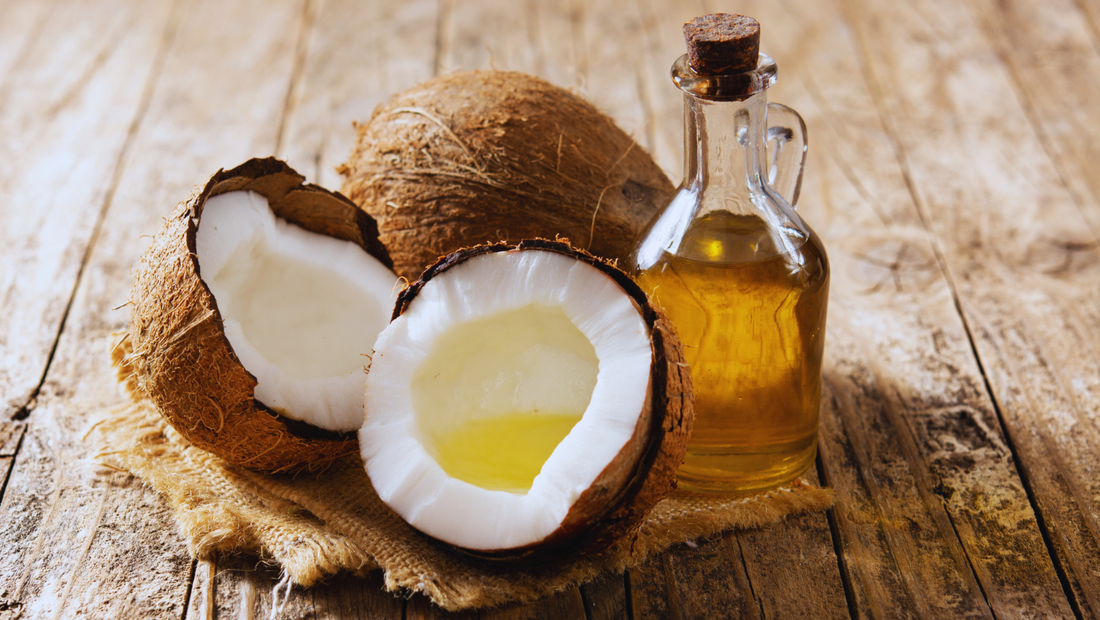
Benefits of Coconut Oil for Skin
Share
Coconut Oil
Carrier Oil Series
First of all, what is a carrier oil?
A carrier oil is (usually) a plant-based oil from seeds and nuts such as sweet almond, coconut, olive, pumpkin, jojoba, grapeseed and more. Carrier oils are commonly used to dilute essential oils and, you guessed it, CARRY the essential oil onto the skin, as many essential oils can cause skin irritation when undiluted.
Starting with coconut oil, I will be covering the 3 carrier oils that we use the most, which include: Coconut, olive and pumpkin seed oil.
We whip these oils with raw, unrefined Shea butter to make our incredibly moisturizing body butters (if you haven't checked out our article on the benefits of Shea butter for skin, click here).
Coconut
Coconut oil is a plant-based oil extracted from the kernels or meat of mature coconuts that are harvested from the coconut palm (Cocos nucifera). It’s highly saturated (over 80% saturated fat) and solid at below 75℉ (23.9°C), but turns to liquid once heated above that.
Approximately 65% of coconut oil’s composition is medium-chain fatty acids. There is one in particular, however, known as lauric acid, that makes up the majority of the medium-chain fatty acids present in coconut oil. Lauric acid has some antimicrobial activity (due to a compound present called “monolaurin”). Monolaurin is a derivative of lauric acid, and comprises about 50% of coconut’s fat content. It exhibits antiviral and antifungal activity by disintegrating the lipid membrane of lipid-coated bacteria, as well as fungal and viral cell membranes - which leads to cell death.
One study tested the antibacterial properties of 30 different types of fatty acids against 20 different strains of bacteria - lauric acid was found to be the most effective at halting the growth of bacteria.
Due to its antioxidant content, coconut oil was shown to have anti-inflammatory properties and aid in wound healing. It increases levels of collagen, which aids in wound healing.
- Pros:
- It hydrates skin - coconut oil acts as an emollient, which aids in moisturizing the skin
- It improves the skin barrier and locks in moisture
- Water loss from the skin (known as transepidermal water loss) can occur from certain conditions like eczema, rosacea and dermatitis.
- Anti-inflammatory
- Soothes irritation and promotes faster wound healing
- Helps to protect from sun damage
- Has some antimicrobial activity
- Increases collagen production
- Cons
- Excellent for use on the body, but can be comedogenic and clog pores of the face, leading to acne.
- Great for those with dry skin, but those with oily/acne-prone skin may want to avoid.
Overall, coconut oil packs quite a punch in skincare, as there are many positive benefits from using it.
Are you a fan of coconut oil? Leave a comment and let us know what you think!

2 comments
Coconut oil has so many benefits! Thank you for posting this article breaking down how it helps nourish the skin! I did not know it was also good for fighting bacteria… Good to know!
Love your products with coconut oil, keeps my skin hydrated all day long!